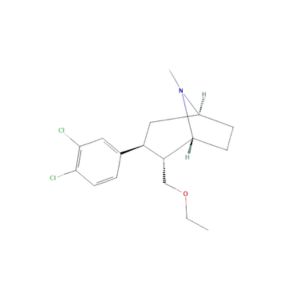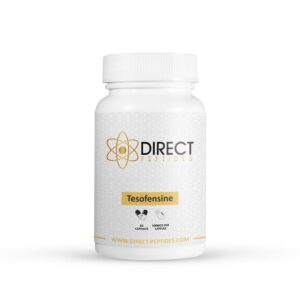Buy Tesofensine Peptide
Tesofensine is a serotonin noradrenaline dopamine reuptake inhibitor (SNDRI) from the phenyltropane family of drugs. It was originally developed for the treatment of Alzheimer’s and Parkinson’s disease, but it lacked efficacy for these conditions. However, it has shown potential in the treatment of obesity due to its ability to suppress appetite.
Buy Tesofensine 500mcg Peptide Capsules Today!
What Is Tesofensine?
Tesofensine, an innovative pharmacological agent, has emerged as a promising candidate for weight loss therapy and obesity management. Initially developed for the treatment of Parkinson’s disease due to its dopaminergic properties, it has shown considerable potential in promoting weight loss in clinical trials.
This compound functions as a triple monoamine reuptake inhibitor, affecting serotonin, dopamine, and norepinephrine neurotransmitters in the brain. Such action not only helps in reducing appetite but may also boost metabolic rates, contributing significantly to weight loss.
While tesofensine was found to be less effective in managing neurodegenerative diseases compared to existing treatments, it has been associated with nearly twice the weight loss seen with current weight loss medications. However, the precise mechanisms through which it influences satiety and energy balance are still being explored.
Studies suggest that tesofensine, also referred to as TE, is more efficient in elevating levels of norepinephrine and serotonin than dopamine. This discrepancy could explain its limited success in treating Parkinson’s disease.
Moreover, tesofensine indirectly promotes cholinergic neurotransmission, which can enhance cognitive functions, learning, and memory through the BDNF pathway. This is advantageous for treating conditions like depression and cognitive decline, making tesofensine a compound of interest beyond its weight loss properties.
It is important to note that you can only buy Tesofensine for research purposes at this time. Further research is needed to discover its long term effects before the FDA will approve it as an OTC medication.
Structure of Tesofensine

Sequence: It is not classified as a peptide.
PubChem CID: 11370864
Molecular Formula: C17H23Cl2NO
Molecular Weight: 328.3 g/mol
Tesofensine Mechanism Of Action
Tesofensine’s mechanism of action centers around its capacity to inhibit the reuptake of three key monoaminergic neurotransmitters: serotonin, dopamine, and norepinephrine. According to research, by impeding the process through which these neurotransmitters are reabsorbed into the nerve cells in the brain, tesofensine increases their availability within the synaptic gap. This elevated presence of neurotransmitters enhances neural communication, particularly in brain regions associated with appetite regulation and metabolic processes.
Consequently, the enhanced neurotransmitter activity contributes to reduced appetite and potentially increases metabolic rate, leading to weight loss. This tripartite approach distinguishes tesofensine from other weight management medications, which typically target a single neurotransmitter pathway.
Initial clinical trials have demonstrated promising results regarding tesofensine’s efficacy in promoting significant weight loss, surpassing that of currently available medications. Nonetheless, ongoing research and comprehensive clinical trials are essential to fully understand its safety profile, potential side effects, and long-term impacts on obesity and related metabolic disorders.
What Are The Research Benefits of Tesofensine 500mcg?
Tesofensine Effects on Weight Loss
- Optimal Conditions: TE works best when combined with caloric restrictions and exercise, though weight loss still occurs without these changes.
- Clinical Trial Results: In one trial, men lost 1.8 kg in two weeks on tesofensine while maintaining their usual diet and activity, compared to placebo.
- Increased Satiety: Participants reported increased satiety and reduced appetite.
- Energy Expenditure: There was a nearly 5% higher energy expenditure during sleep compared to placebo, correlating with increased fat oxidation.
- Appetite Control: Research reveals satiety is centrally controlled and challenging to modify permanently, with tesofensine significantly reducing appetite.
- Effect of Discontinuation: Discontinuing TE returns sensations to baseline, but reintroduction suppresses them again, indicating appetite sensations are more permanent.
- Hunger Mitigation: Tesofensine mitigates persistent hunger signals, showing significant weight loss in clinical trials.
- Longevity of Effects: Unlike other appetite-affecting compounds, tesofensine’s effects diminish but do not stop completely. It has longer-lasting effects than other aids with substantial rebound to baseline after a short break.
- Potential for Cycled Use: No long-term trials on cycled TE have been conducted, but evidence suggests that appropriately cycled use might result in even greater weight loss.
Tesofensine Effects on Blood Sugar
Research in rats has shown that tesofensine improves glycemic control and reduces insulin response, aiding in weight loss. By moderating insulin’s effect on fat storage, it helps prevent fat accumulation even with high blood sugar levels. Tesofensine also breaks the cycle of fat deposition and inflammation, balancing metabolism and combating adiposity.
Tesofensine Effects on Cognitive Health
Despite tesofensine’s discontinuation for neurodegenerative diseases, evidence suggests it benefits cognitive function, memory, and neurogenesis. It enhances brain-derived neurotrophic factor (BDNF) in rat models, promoting neurogenesis and synaptic transmission. Altered BDNF signaling is linked to several mental health conditions. This underscores the necessity for future research to examine tesofensine’s effects on BDNF and brain health, emphasizing the importance of further exploration into its mechanisms and potential benefits.
Tesofensine Effects on Mood Disorders
TE, known for its dopaminergic and anti-obesity effects, may also have antidepressant properties by improving BDNF levels and promoting neurogenesis in the hippocampus. This dual action makes it a promising treatment for individuals facing both weight and mood disorders, addressing depression linked to stress-induced hippocampal atrophy.
Tesofensine Effects on Pain Management
The use of antidepressants in pain management is well-documented. Tri-cyclic antidepressants, early drugs for mood disorders, are known to reduce pain perception, especially in conditions like fibromyalgia. Research shows that the pain-relief effects of standard antidepressants, which affect serotonin and norepinephrine, are boosted by adding dopamine agents. This leads to the hypothesis that triple reuptake inhibitors like tesofensine may benefit pain management.
Tesofensine Safety and Future Research
Anti-obesity drugs have a history of cardiovascular side effects, notably Fen-Phen and sibutramine, resulting in their market withdrawal due to serious heart risks. This has limited treatment options and caused patient reluctance. Phentermine can be used short-term but carries a negative reputation.
When considering whether to buy Tesofensine, it is important to note that it shows a better risk profile with its unique action on neurotransmitter reuptake. However, some debate exists about trial design and underreporting of side effects.
Critics suggest more clear distinctions between pre-existing conditions and new symptoms. If you decide to buy Tesofensine for research, it is crucial to be aware of these considerations while evaluating its potential benefits against its risk profile.
Further Answered Questions of Tesofensine (FAQ’s)
Is Tesofensine a Peptide?
Tesofensine is not a peptide, it belongs to the phenyltropane family, which was first developed to combat cocaine addiction. These drugs aimed to mimic cocaine’s stimulation without its addictive effects, targeting the central nervous system to avoid dependency.
Its development focus explains why TE affects neurotransmission, especially dopamine pathways involved in reward and addiction. Research indicates that tesofensine doesn’t possess qualities that would make it attractive for recreational use, effectively lowering the addictive potential of such stimulants.
Where can I buy Tesofensine?
You can buy Tesofensine from reputable suppliers such as Direct Peptides, which ensures the product’s quality through stringent testing protocols. It is essential to buy Tesofensine from credible sources to guarantee the safety and efficacy of the product.
What are the benefits of Tesofensine?
In clinical trials, TE, combined with a calorie-restricted diet and daily exercise, showed significant benefits. Participants saw a decrease in body weight and BMI, improved waist-to-hip ratios, lower triglycerides and very low-density lipoprotein levels, and a significant reduction in body and visceral fat. There was also evidence of a reversing effect on type 2 diabetes.
What are the side effects of Tesofensine?
Tesofensine, like other weight loss drugs, may cause side effects such as insomnia, dry mouth, constipation, tachycardia, diarrhoea, nausea, increased heart rate, and high blood pressure, highlighting the need for medical supervision.
Can Tesofensine Cause Addiction?
Extensive research shows that Tesofensine is not addictive, making it a promising compound for further study. Researchers should buy Tesofensine from reputable sources to ensure its integrity. Adhering to dosage guidelines and rigorous monitoring is crucial for safe administration in clinical studies. Strict oversight allows exploration of Tesofensine’s effectiveness and safety, providing valuable insights to the scientific community.
Is Tesofensine legal?
The legality of Tesofensine varies by country and its pharmaceutical regulations. In some places, it may be approved for specific medical use, while in others, it remains under investigation. The FDA (Food and Drug Administration) in the U.S. has not approved Tesofensine for human consumption, and its legal status is still under review. Consult applicable laws in accordance with your local regulatory authorities to understand its legal status in your area. It’s also important to buy Tesofensine from reputable sources and follow local legal guidelines to ensure safety and compliance.
How should Tesofensine be stored?
Tesofensine should be stored in a cool, dry place, away from direct sunlight and moisture. Ideal storage conditions are typically outlined by the manufacturer, but generally, keeping the capsules in a temperature-controlled environment between 15°C and 25°C (59°F and 77°F) is recommended. Always ensure the container is tightly sealed and out of reach of children and pets. Following proper storage guidelines helps maintain the integrity and efficacy of Tesofensine.
Buy Tesofensine 500mcg Capsules
Tesofensine 500mcg Capsules for sale from Direct Peptides
Summary of Research Applications
- Triple Monoamine Reuptake Inhibition: Research suggests TE acts as a serotonin-noradrenaline-dopamine reuptake inhibitor (SNDRI), thereby increasing the availability of these neurotransmitters in the brain [1].
- Appetite Suppression: Studies indicate the peptide primarily works on the hypothalamus, an important area for appetite regulation. This action enhances satiety signals, leading to reduced food intake [2].
- Efficacy in Weight Loss: A Phase II trial demonstrated significant weight loss in obese patients treated with tesofensine, showing a mean weight loss of 12.8 kg at the highest dose over 24 weeks [3].
- Role in Research: TE exemplifies a novel approach to obesity treatment by targeting neurotransmitter systems. While it has shown promising results, it’s still not approved for clinical use, indicating its current role is mainly within research settings [3].
- Enhanced Energy Levels: Studies often report increased energy levels, which can further maintain a healthy lifestyle and improve adherence to exercise regimens.
- Neuroprotective Benefits: studies have shown they exhibit promising neuroprotective properties, particularly by enhancing cognition such as learning and memory, which may benefit individuals experiencing cognitive decline.
- Antidepressant Effects: By elevating levels of dopamine in the brain, Tesofensine has been shown to boost levels of Brain-Derived Neurotrophic Factor (BDNF), contributing to its antidepressant properties and supporting mental health.
- Enhanced Insulin Sensitivity: Tesofensine capsules can potentially improve insulin sensitivity, offering a critical advantage for patients at risk of developing Type II diabetes, and aiding in better blood sugar management. This in turn has the beneficial effects of reducing the risk of metabolic syndrome and heart disease.
Tesofensine Quality Assured
Ensuring the highest quality standards for tesofensine is a top priority for Direct Peptides. The company follows strict quality control protocols throughout the production process, from raw material selection to the final product.
Comprehensive testing verifies the purity, potency, and safety of tesofensine, meeting and exceeding industry and regulatory standards. Each batch undergoes rigorous assessment in advanced laboratories, using analytical techniques to detect impurities or inconsistencies.
Customers who buy Tesofensine from Direct Peptides can trust they are receiving a meticulously crafted and thoroughly evaluated product for optimum efficacy and safety.
References For Further Reading
[1] K A Schoedel, D Meier, B Chakraborty, P M Manniche, E M Sellers (2010) Subjective and objective effects of the novel triple reuptake inhibitor tesofensine in recreational stimulant users – Clinical Pharmacology and Therapeutics, 2010 Jul;88(1):69-78.
[2] A.Astrup, D.H.Meier, B.O.Mikkelsen, et al (2008) Weight loss produced by tesofensine in patients with Parkinson’s or Alzheimer’s disease – Obesity (a research journal) Silver Spring Md, vol. 16, no. 6, pp. 1363–1369, Jun. 2008.
[3] M.H.Larsen, H.Rosenbrock, F.Sams-Dodd, and J.D.Mikkelsen (2007) Expression of brain derived neurotrophic factor, activity-regulated cytoskeleton protein mRNA, and enhancement of adult hippocampal neurogenesis in rats after sub-chronic and chronic treatment with the triple monoamine re-uptake inhibitor tesofensine – European Journal of Pharmacology, 2007 Jan 26;555(2-3):115-21.
[4] A.Astrup, S.Madsbad, L.Breum et al (2008) Effect of tesofensine on bodyweight loss, body composition, and quality of life in obese patients: a randomised, double-blind, placebo-controlled trial – Lancet Journal, 2008 Nov 29;372(9653):1906-1913.
[5] AB.Saniona (2018) Saniona’s tesofensine meets primary and secondary endpoints in Phase 3 obesity registration trial – Press Releases from GlobeNewswire News Room, Dec. 17, 2018.
[6] J.A.Gilbert, C.Gasteyger, A.Raben, et al (2012) The effect of tesofensine on appetite sensations – Obesity (Silver Spring Md) volume 20, no. 3, pp. 553–561, Mar. 2012.
[7] L.Appel, M.Bergström, J.B.Lassen, and B.Långström (2014) Tesofensine, a novel triple monoamine re-uptake inhibitor with anti-obesity effects: Dopamine transporter occupancy as measured by PET – European Neuropsychopharmacology, Volume 24, Issue 2, February 2014, Pages 251-261.
[8] A.Sjödin, C.Gasteyger, A.Lh.Nielsenet et al (2010) The effect of the triple monoamine reuptake inhibitor tesofensine on energy metabolism and appetite in overweight and moderately obese men – International Journal of Obesity, volume 34, no. 11, pp. 1634–1643, Nov. 2010.
[9] A.M.D.Axel, J.D.Mikkelsen, and H.H.Hansen (2010) Tesofensine, a novel triple monoamine reuptake inhibitor, induces appetite suppression by indirect stimulation of alpha1 adrenoceptor and dopamine D1 receptor pathways in the diet-induced obese rat – Neuropsychopharmacology, 2010 Jun;35(7):1464-76.
[10] S.M.Korte, J.Prins, A.M.Krajnc et al (2015) The many different faces of major depression: it is time for personalized medicine – European Journal of Pharmacology, 2015 Apr 15:753:88-104.
[11] Ł.R.Drzyzga, A.Marcinowska, and E.Obuchowicz (2009) Antiapoptotic and neurotrophic effects of antidepressants: a review of clinical and experimental studies – Brain Research Bulletin, Volume 79, Issue 5, 30 June 2009, Pages 248-257.
[12] D.M.Marks, C.U.Pae, and A.A.Patkar (2008) Triple Reuptake Inhibitors: The Next Generation of Antidepressants – Current Neuropharmacology, 2008 Dec; 6(4): 338–343.
[13] A.Astrup, S.Madsbad, L.Breum et al (2013) Under-reporting of adverse effects of tesofensine – The Lancet Jounral, Correspondence, Volume 382, Issue 9887, P127, July 13, 2013.
[14] B.M.Yung Cheung, T.Tsang Cheung, N.R.Samaranayake (2013) Safety of antiobesity drugs – Therapeutic Advances in Drug Safety, 2013 Aug 4, (4):171-81.
Why Choose Direct Peptides ?
Buy Tesofensine 500mcg today and discover unrivalled quality with Direct Peptides , your premier source for Tesofensine Capsules.
ALL CONTENT AND PRODUCT INFORMATION AVAILABLE ON THIS WEBSITE IS FOR EDUCATIONAL PURPOSES ONLY.
DISCLAIMER: These products are intended solely as a research chemical only. This classification allows for their use only for research development and laboratory studies. The information available on our Direct Peptides website: https://direct-peptides.com is provided for educational purposes only. These products are not for human or animal use or consumption in any manner. Handling of these products should be limited to suitably qualified professionals. They are not to be classified as a drug, food, cosmetic, or medicinal product and must not be mislabelled or used as such.



